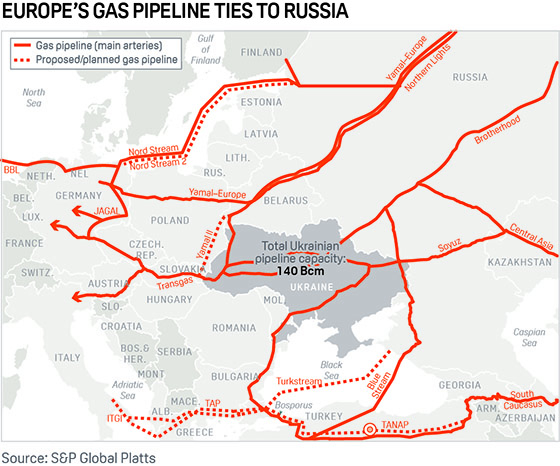HIGHLIGHTS
- Spain will be governed by an untested coalition that does not control a majority in parliament, which will render the policymaking process more complex and limit the new government’s effectiveness.
- The Spanish economy is slowing, and a combination of risk factors (from ongoing trade disputes with the United States to unresolved secession disputes with Catalonia) will contribute to even slower growth in 2020.
- Companies operating in Spain will deal with greater fiscal pressures and a government that will seek to backtrack on some of the labor market reforms that were introduced during the peak of the economic crisis in the early 2010s.
Spain has just appointed its first coalition government since the return of democracy in the late 1970s, but the new government will struggle to pass structural reforms at a time of growing political fragmentation and slowing economic growth. Prime Minister Pedro Sanchez, who won a vote of investiture in parliament on Jan. 7 and will lead a coalition between his center-left Socialist Party (PSOE) and the left-wing Unidas Podemos (UP), will have to deal with a worsening economic environment, a precarious labor market and secession pressure from Catalonia. Companies operating in Spain, for their part, will face higher taxes and the reversal of some of the market-friendly policies that were introduced during the peak of the economic crisis in the early 2010s.
The Big Picture
In recent years Spain’s political system has become more fragmented, general elections have become more frequent and structural reforms have become harder to implement. For the most part, the Spanish economy has been immune to political events, growing nonstop since 2014. But that immunity is ending, and Spain’s new coalition government takes office facing slowing growth, unresolved secession disputes in Catalonia and a precarious labor market.
A Fragmented Political Landscape
Between the 1980s and early 2010s, Spain had single-party governments led by either the PSOE or the center-right People’s Party. But in recent years, a combination of factors ranging from the economic crisis to corruption scandals led to the emergence of new political parties on the left and the right. As a result, Spanish parliaments have become more fragmented, early elections have become more frequent, and governments have had a harder time implementing policy. This development explains why Sanchez is the first prime minister to lead a coalition government since the end of Gen. Francisco Franco’s dictatorship in the late 1970s.
In a further complication, PSOE and UP do not control the majority of seats in parliament, meaning members of the coalition will have to first agree on policy with each other, and then seek support in parliament on a case-by-case basis. This will open the door to disagreements between the coalition partners and create a complex legislative process wherein the government will need to make concessions to smaller parties in parliament to pass legislation. Policymaking will, therefore, become more complex, slower and subject to constant pitfalls.

This complex political landscape will subject companies operating in Spain to recurrent uncertainty, both about the survival of the government and about future policy. The Spanish Constitution makes it hard for the opposition to oust a government, rendering the chances of a successful no-confidence motion against Sanchez low. However, disputes between the PSOE and UP could lead to the dissolution of their alliance that almost certainly would lead to an early election. At the same time, parliament’s fragmentation may force the government to modify or abandon its policy proposals, making it difficult for businesses to make long-term predictions about the continuity of policy.
Businesses in Spain, particularly in sectors such as banking and energy, probably will face greater fiscal pressure since the new government is expected to try to raise taxes on high earners and large corporations. For example, the PSOE and UP have agreed to introduce a tax on financial services, which will affect Spain’s robust financial sector. PSOE and UP have also agreed to backtrack on some labor reforms introduced during the peak of the economic crisis in 2012 by making it harder for companies to dismiss workers, reducing the use of temporary contracts and giving priority to collective bargaining on salaries instead of company-specific negotiations. Without a parliamentary majority of its own, the PSOE-UP alliance will have to reach out to smaller parties to introduce reforms in taxation and the labor legislation. Center-left parties such as the Republican Left of Catalonia (ERC), Mas Pais and EH Bildu could endorse these reforms, but they will make demands of their own in exchange for their support.
A Slowing Economy
Spain’s economy has largely been immune to the country’s increasing political complexity and uncertainty, growing every year since 2014 thanks to a combination of business-friendly measures introduced by Madrid during the economic crisis and a generalized improvement in the eurozone economy during the late-2010s. But that immunity seems to be over. Most forecasts predict that Spain’s GDP growth will slow in 2020 and 2021. This slowdown is connected to multiple foreign and domestic factors.

Trade disputes between the European Union and the United States will continue in 2020 and take their toll on Spain’s economy. The United States introduced higher tariffs on some Spanish exports such as olive oil and wine in 2019, and the White House could raise tariffs on additional products in 2020, especially if the European Union targets the United States with its own tariff hikes. This move would dent the Spanish economy because the United States is Spain’s main non-EU export destination (roughly 5 percent of Spanish exports go to the United States). In addition, Madrid’s plan to introduce a tax on digital companies (a decision the White House would oppose vehemently) could also prompt the U.S. administration to retaliate with additional tariff hikes.
At the same time, Brexit-related uncertainty will ease during the early months of 2020 but will return by the end of the year. The United Kingdom almost certainly will leave the European Union on Jan. 31 and will remain in the single market until Dec. 31. But should London and Brussels fail to reach a comprehensive trade deal by the end of 2020, and should London refuse to request an extension to remain in the single market, significant disruptions in trade would follow. The United Kingdom is Spain’s fifth-largest export destination (almost 7 percent of Spanish exports go to Britain), while millions of British tourists visit Spain every year. New barriers to trade (such as having to implement World Trade Organization tariffs if the United Kingdom and European Union fail to reach a trade deal by year’s end) would damage Spanish exports, while a weaker pound vis-a-vis the euro would lead to fewer British tourists in Spain — to name only two of the many consequences of weaker EU-U.K. economic ties.
The new Spanish government will also deal with domestic economic problems, particularly connected to the labor market. While Spain’s unemployment rate has been falling fast in recent years, it remains the second-highest in the European Union after Greece’s. Spain also has high rates of youth unemployment (around 30 percent) and a serious problem of long-term unemployment (people who have been out of work for more than a year find it much harder to find jobs than those unemployed for only a few months). Finally, Spain has the European Union’s highest rate of workers under temporary contracts: One employee in four is under a fixed-term contract, twice the EU average. This precarious labor market drags down domestic consumption and investment, which, in turn, undermines economic growth. The PSOE-UP alliance will seek to address these problems through reform in labor legislation, but it will need to persuade like-minded parties in parliament to join the effort, which will not be easy.
Unresolved Catalan Issues
The new Spanish government will also have to deal with Catalonia’s push for independence. The region will not secede from Spain any time soon, but the secession issue will continue to generate friction between Madrid and Barcelona and raise questions about the future of Spain’s territorial integrity.
Sanchez will benefit from the tense relationship between Catalonia’s main pro-independence forces, Together for Catalonia (JxC) and the ERC, which reduces the chances of a coordinated push for secession. JxC and ERC, which compete to be the region’s main political party, advocate different strategies to achieve independence. Some JxC members want to take unilateral measures to secede from Spain, while the ERC favors a more pragmatic strategy that includes dialogue with the central government in Madrid.
Their competition will increase in 2020 because Catalonia probably will hold an early regional election. This vote means that pro-independence parties will not be strong enough or united enough to seriously threaten Spain’s territorial integrity. Moreover, Sanchez’s promise to keep an open dialogue with Catalan secessionists and to improve ties between Madrid and Barcelona suggests that the central government will seek appeasement rather than confrontation to deal with the rebel region.
An important fact remains unchanged. Madrid will not authorize a legally-binding independence referendum in Catalonia, and the region’s pro-independence parties will not stop demanding it.
An important fact remains unchanged. Madrid will not authorize a legally-binding independence referendum in Catalonia, and the region’s pro-independence parties will not stop demanding it.
However, an important fact remains unchanged. Madrid will not authorize a legally-binding independence referendum in Catalonia, and the region’s pro-independence parties will not stop demanding it. The situation of the pro-independence leaders who were jailed after the unilateral declaration of independence in 2017 will also continue to create issues between Madrid and Barcelona.
PSOE and UP have promised to introduce a “fairer” mechanism to distribute state funds among Spain’s autonomous communities and to “reduce the ambiguity” in the policy attributions of the central state and the regional governments, both of which are meant to appease Catalonia. But they will struggle to win enough support in parliament to pass these reforms. As a result, tensions between Madrid and Barcelona probably will not be as extreme as they were in 2017 when Catalonia unilaterally declared independence, but long-term questions about the future of the region will not go away either.
So, while companies operating in Catalonia will see some degree of stability in 2020, their doubts about the future of the region will remain unanswered. Political uncertainty so far has had a modest effect in Catalonia because the region’s economy has grown nonstop since 2014. However, Spain’s National Institute of Statistics recently reported that Catalonia’s regional GDP grew at a rate lagging the average for Spain as a whole in 2017 and 2018. In the meantime, thousands of companies have moved their legal seats out of Catalonia to other Spanish regions since Catalonia’s independence declaration in 2017. While the vast majority of these companies retained operations and workers in Catalonia, the change of legal seat highlights the concern that the independence process has created among businesses in the region.
While Sanchez’s appeasement strategy probably will lead to a decrease of frictions between Madrid and Barcelona, it will create the risk of a nationalist backlash among Spain’s conservative parties. The People’s Party already has announced that it will take to the streets to protest Sanchez’s decision to keep the dialogue with Catalan separatists open, and the right-wing Vox party could do the same.
At the same time, the European Court of Justice recently ruled that ERC leader Oriol Junqueras, who was elected to the European Parliament in May, enjoyed parliamentary immunity when he was sentenced to 13 years in prison in October for his participation in the illegal Catalan independence referendum in 2017. The final decision on whether Junqueras should be released from prison is in the hands of the Spanish Supreme Court, but the European court’s ruling in favor of a convicted Catalan separatist could exacerbate Euroskeptic sentiments in Spain, particularly among Vox voters. Even if Sanchez tries to calm frictions with Catalonia, the situation in the region will continue to be a central element in Spanish politics.
An important fact remains unchanged. Madrid will not authorize a legally-binding independence referendum in Catalonia, and the region’s pro-independence parties will not stop demanding it.
 As the world’s leading geopolitical intelligence platform, Stratfor brings global events into valuable perspective, empowering businesses, governments and individuals to more confidently navigate their way through an increasingly complex international environment. Stratfor is an official partner of the Affiliate Network.
As the world’s leading geopolitical intelligence platform, Stratfor brings global events into valuable perspective, empowering businesses, governments and individuals to more confidently navigate their way through an increasingly complex international environment. Stratfor is an official partner of the Affiliate Network.




 Geo-Strategic Imperative
Geo-Strategic Imperative s Golightly is an Independent Consulting Engineer specializing in offshore renewable energy, based in Brussels. Prior to 2010 he worked in the Oil & Gas industry.
s Golightly is an Independent Consulting Engineer specializing in offshore renewable energy, based in Brussels. Prior to 2010 he worked in the Oil & Gas industry.
 Jared Wilhelm is a Foreign Area Officer and former Naval Aviator who lives in Italy. He is a member of the Military Writer’s Guild, was named a 2014 Olmsted Scholar, and is a graduate of the U.S. Naval Academy, U.S. Naval Postgraduate School, and the U.S. Naval War College. His views are his own and do not represent the views or position of any other entity. He has previously published numerous articles on democracy around the world, including
Jared Wilhelm is a Foreign Area Officer and former Naval Aviator who lives in Italy. He is a member of the Military Writer’s Guild, was named a 2014 Olmsted Scholar, and is a graduate of the U.S. Naval Academy, U.S. Naval Postgraduate School, and the U.S. Naval War College. His views are his own and do not represent the views or position of any other entity. He has previously published numerous articles on democracy around the world, including